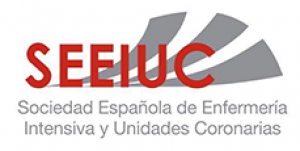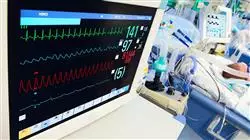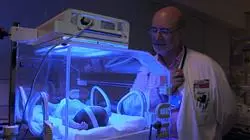University certificate
Scientific endorser

The world's largest faculty of nursing”
Introduction to the Program
With the Postgraduate certificate in Neonatal Pharmacology for Nursing you have the opportunity to update your knowledge in a practical way and without renouncing to the maximum scientific rigor, to incorporate the latest advances in critical nursing care of the newborn"

Neonatology is a discipline in constant evolution, which is highly dependent on technology and new pharmacological treatments. This context makes the updating of procedures in Neonatal Critical Care, both those performed in the Neonatal ICU and in other care settings outside the ICU (emergency units, primary care centers, etc.), of utmost importance to maintain the provision of care based on the latest scientific evidence and to ensure the safety of the baby.
This program includes the most important aspects of the use of pharmacology in the newborn patient, developing the appropriate nursing interventions in each case and describing drug interactions in common processes in the neonate. In addition, it presents an update on neonatal assessment and examination, NICU admission procedures, and nursing care.
This Postgraduate certificate in Neonatal Pharmacology for Nursing is oriented to facilitate the updating of the most used procedures, in a practical way, to contribute with quality and safety to the recovery of the newborn, improve its prognosis and avoid the sequelae of severe pathology.
Improve the care of your newborn patients with the specialization offered by the Postgraduate certificate in Neonatal Pharmacology for Nursing"
This Postgraduate certificate in Neonatal Pharmacology for Nursing contains the most complete and up-to-date scientific program on the market. The most important features include:
- Clinical cases presented by experts in the different specialties
- The graphic, schematic, and practical contents with which they are created provide scientific and practical information on the disciplines that are essential for professional practice
- New developments in nursing care and assessment of the critically ill newborn patient
- Includes drug interactions of the main drugs used in the NICU
- An algorithm-based interactive learning system for decision-making in the clinical situations presented throughout the course
- All of this will be complemented by theoretical lessons, questions to the expert, debate forums on controversial topics, and individual reflection assignments
- Content that is accessible from any fixed or portable device with an Internet connection
This Postgraduate certificate is the best investment you can make when selecting a refresher program, for two reasons: in addition to updating your knowledge in Neonatal Pharmacology for Nursing, you will obtain a qualification endorsed by TECH Global University”
Its teaching staff includes renowned specialists in the field of neonatology, who bring to this program their work experience in international leading medical centres.
Thanks to its multimedia content developed with the latest educational technology, they will allow the professional a situated and contextual learning, that is to say, a simulated environment that will provide an immersive learning programmed to train in real situations.
The design of this program is based on Problem-Based Learning, through which the nursing professional must try to solve the different professional practice situations that arise throughout the program. For this purpose, the professional will be assisted by an innovative interactive video system developed by renowned experts in neonatal critical patient care and with extensive teaching experience.
This course allows learning in simulated environments, which provide immersive education programmed to learn for real situations"

It includes clinical cases to bring the development of the program as close as possible to the reality of nursing care"
Why study at TECH?
TECH is the world’s largest online university. With an impressive catalog of more than 14,000 university programs available in 11 languages, it is positioned as a leader in employability, with a 99% job placement rate. In addition, it relies on an enormous faculty of more than 6,000 professors of the highest international renown.

Study at the world's largest online university and guarantee your professional success. The future starts at TECH”
The world’s best online university according to FORBES
The prestigious Forbes magazine, specialized in business and finance, has highlighted TECH as “the world's best online university” This is what they have recently stated in an article in their digital edition in which they echo the success story of this institution, “thanks to the academic offer it provides, the selection of its teaching staff, and an innovative learning method aimed at educating the professionals of the future”
A revolutionary study method, a cutting-edge faculty and a practical focus: the key to TECH's success.
The most complete study plans on the university scene
TECH offers the most complete study plans on the university scene, with syllabuses that cover fundamental concepts and, at the same time, the main scientific advances in their specific scientific areas. In addition, these programs are continuously being updated to guarantee students the academic vanguard and the most in-demand professional skills. In this way, the university's qualifications provide its graduates with a significant advantage to propel their careers to success.
TECH offers the most comprehensive and intensive study plans on the current university scene.
A world-class teaching staff
TECH's teaching staff is made up of more than 6,000 professors with the highest international recognition. Professors, researchers and top executives of multinational companies, including Isaiah Covington, performance coach of the Boston Celtics; Magda Romanska, principal investigator at Harvard MetaLAB; Ignacio Wistumba, chairman of the department of translational molecular pathology at MD Anderson Cancer Center; and D.W. Pine, creative director of TIME magazine, among others.
Internationally renowned experts, specialized in different branches of Health, Technology, Communication and Business, form part of the TECH faculty.
A unique learning method
TECH is the first university to use Relearning in all its programs. It is the best online learning methodology, accredited with international teaching quality certifications, provided by prestigious educational agencies. In addition, this disruptive educational model is complemented with the “Case Method”, thereby setting up a unique online teaching strategy. Innovative teaching resources are also implemented, including detailed videos, infographics and interactive summaries.
TECH combines Relearning and the Case Method in all its university programs to guarantee excellent theoretical and practical learning, studying whenever and wherever you want.
The world's largest online university
TECH is the world’s largest online university. We are the largest educational institution, with the best and widest online educational catalog, one hundred percent online and covering the vast majority of areas of knowledge. We offer a large selection of our own degrees and accredited online undergraduate and postgraduate degrees. In total, more than 14,000 university degrees, in eleven different languages, make us the largest educational largest in the world.
TECH has the world's most extensive catalog of academic and official programs, available in more than 11 languages.
Google Premier Partner
The American technology giant has awarded TECH the Google Google Premier Partner badge. This award, which is only available to 3% of the world's companies, highlights the efficient, flexible and tailored experience that this university provides to students. The recognition as a Google Premier Partner not only accredits the maximum rigor, performance and investment in TECH's digital infrastructures, but also places this university as one of the world's leading technology companies.
Google has positioned TECH in the top 3% of the world's most important technology companies by awarding it its Google Premier Partner badge.
The official online university of the NBA
TECH is the official online university of the NBA. Thanks to our agreement with the biggest league in basketball, we offer our students exclusive university programs, as well as a wide variety of educational resources focused on the business of the league and other areas of the sports industry. Each program is made up of a uniquely designed syllabus and features exceptional guest hosts: professionals with a distinguished sports background who will offer their expertise on the most relevant topics.
TECH has been selected by the NBA, the world's top basketball league, as its official online university.
The top-rated university by its students
Students have positioned TECH as the world's top-rated university on the main review websites, with a highest rating of 4.9 out of 5, obtained from more than 1,000 reviews. These results consolidate TECH as the benchmark university institution at an international level, reflecting the excellence and positive impact of its educational model.” reflecting the excellence and positive impact of its educational model.”
TECH is the world’s top-rated university by its students.
Leaders in employability
TECH has managed to become the leading university in employability. 99% of its students obtain jobs in the academic field they have studied, within one year of completing any of the university's programs. A similar number achieve immediate career enhancement. All this thanks to a study methodology that bases its effectiveness on the acquisition of practical skills, which are absolutely necessary for professional development.
99% of TECH graduates find a job within a year of completing their studies.
Postgraduate Certificate in Neonatal Pharmacology for Nursing
If you are a nurse and want to specialize in drug treatment for newborns, TECH, a world leader in higher distance education, offers a fully virtual Postgraduate Certificate in Neonatal Pharmacology for Nursing that will allow you to study from anywhere in the world and at any time you have available. This course is designed for nursing professionals to acquire specific knowledge and skills in the area of Neonatal Pharmacology, allowing them to properly manage medications in newborns and premature infants. In the course, the pharmacokinetics and pharmacodynamics of neonatal drugs, as well as the main neonatal pathologies that require pharmacological treatment, such as pulmonary hypertension and neonatal sepsis, will be discussed in depth. In addition, relevant topics such as safe administration of medications, prevention of medication errors and monitoring the effects of medications in neonates will be addressed.
Specialize in neonatal pharmacology
The course is led by highly trained and experienced professionals in the area of Neonatal Pharmacology, which guarantees quality training and updated with the latest advances in the field. By studying virtually, you will be able to organize your study time according to your needs and obligations, without having to physically move anywhere. In addition, you will have access to virtual tools and resources that will allow you to interact with your classmates and professors, as well as to carry out evaluations and follow-ups of your learning. In summary, the Postgraduate Certificate in Neonatal Pharmacology for Nursing at TECH Global University is an excellent option for those nurses who wish to specialize in this area and obtain the necessary skills and knowledge to provide safe and effective care to newborns and premature infants. Don't miss this opportunity to enhance your resume and advance your career - enroll today!







